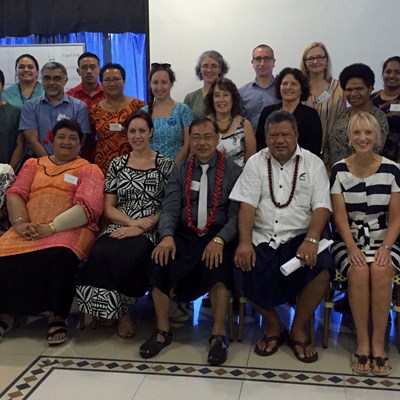Home / News & Events /

 Cervical Cancer Prevention Programme in the Pacific Workshop in Apia - 29th May 2018
Cervical Cancer Prevention Programme in the Pacific Workshop in Apia - 29th May 2018
28 Nov 2018
This was the first of two workshops funded by a Catalyst Seeding Grant (Royal Society of New Zealand) to build collaborations to support cervical cancer screening and treatment in the Pacific and Asia. A range of approaches to cervical screening in the Pacific are being taken and those discussed at the workshop are summarised here:
Enabling technologies for the Pacific: The benefits of HPV testing over cytology were described. HPV testing is safer and more effective than cytology. Cytology doesn’t reduce the incidence of adenocarcinoma. Co-testing (HPV testing and cytology together) has limited additional benefit.
Samoa: (pop. 197,695) There have been between 5-15 new cases of cervical cancer identified every year in Samoa between 2005 and 2012. Screening is opportunistic, using the Pap smear. Cytological analysis is carried out at Tupua Tamasese Meaole Hospital (TTM), the main hospital in Apia. There is no Pathologist based in Samoa however two colposcopes are available and colposcopy is carried out at TTM.
Papua New Guinea (pop. 8,418,346). Around 1,500 women are lost to cervical cancer each year in PNG. The total number of women to be screened is around 1 million. VIA has been tested in PNG but proved to be disappointing. There was a poor correlation between VIA and cervical intraepithelial neoplasia, and the high burden of sexually transmitted infections clouded results. The GeneXpert point-of-care HPV test is now being trialled in PNG, with promising results.
Fiji: (pop. 912,241) Cervical cancer is the cause of 16% of all cancers in Fiji. A cervical screening programme is underway, using cytology (Pap smear), with 9.6 % of target population already screened. Screening has led to a doubling of the rate of detection of CIN lesions. A visual inspection with acetic acid (VIA) and cryotherapy trial has been carried out – 9.6% of women tested were positive with VIA. Funding has been obtained for a pilot point-of-care HPV screening and treatment study in Fiji.
Tonga: (pop. 109,008). There is no government-run cervical screening or screening programme in Tonga. Current screening uses cytology (Pap smear) and is carried out by primarily by Tonga Family Health. There were 295 smears carried out in 2017 and a referral system has been developed for the management of positive cases.
Vanuatu: (pop. 282,117). The CareHPV test is being used to screen 30-50 year old women as part of a research study. The target is to screen 4000 women. Initial data shows around 10% HPV positive women in this age group, with a cancer rate of around 1.2%. One limitation with the CareHPV test is that samples need to be batched and 90 tests are run at once for cost effectiveness. One of the challenges experienced in this study is loss of women to follow up.
Malaysia: (pop. 32,042,458). Around 15% of women in Malaysia are currently being screened using cytology. A pilot project is being carried out (Project ROSE) using self-sampling, HPV testing (GeneXpert), and a cloud-based data management system. Notifications are made to women using SMS.
19 Nov 2019
Samoa Cancer Society Launches its Cervical Cancer…
The Samoa Cancer Society has recently run a radio promotion and have developed important educational…
22 Nov 2018
Cervical Cancer Prevention Programme in the Pacifi…
A two-day cervical cancer prevention in the Pacific region workshop was held in Sydney prior to the…
28 Nov 2018
Cervical Cancer Prevention Workshop Samoa February…
A project initiation stakeholder engagement workshop was held at Saletoga Sands in Samoa in February…